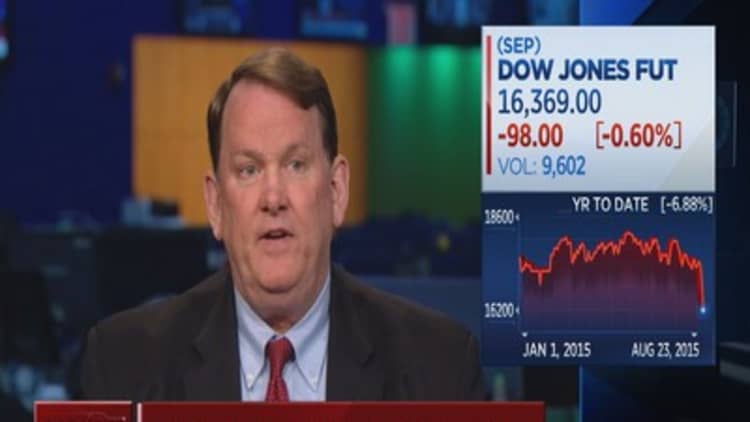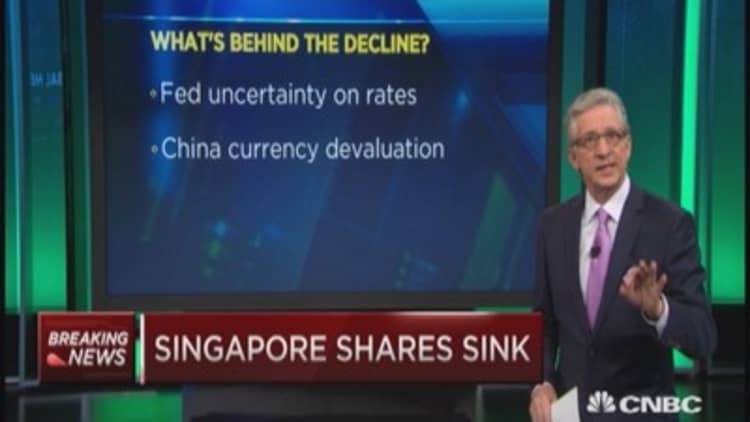





The global markets rout continues Monday and many benchmark indexes are in correction territory.
If you're watching the indexes, you might be tempted to sell. But financial advisors emphasize that at times like this, it's important not to panic and to remember that market corrections are a natural part of investing.
Over the last five years, the S&P 500 is up about 15 percent annualized, points out Tim Courtney, chief investment officer at Exencial Wealth Advisors in Oklahoma City. "But you don't get 15 percent annualized returns for free. There is a cost: you have to be willing to supply capital to markets when it is very uncomfortable to do so."
Since May 2009, the S&P 500 has had pullbacks of 4 percent or greater 19 times, and we are currently in the 20th, Courtney said. That works out to more than three pullbacks per year on average. "Investors who supplied capital during these times captured that 15 percent annual return, while those who avoided equity markets and instead supplied capital to debt markets got 4 percent," he said. "Those who were in and out of equity markets probably got somewhere in-between."
Many CNBC.com readers are sitting tight. As of early this morning, roughly half of the more than 7,500 investors who'd responded to our informal survey said they don't plan to buy or sell any stocks Monday. (Tell us what you're doing here.)
That's not a bad idea for long-term investors, say advisors. They should keep the focus on their retirement goals rather than the recent movements in the market.
"The best advice I could give a client is to remind them why they are investing, what their time frame is and to remind them that they are investing to reach certain goals—not to beat the market," said Pat Grenier, a certified financial planner in Springfield, Massachusetts. "I also advise them not to act on emotions because fear or greed will always fail us."
That said, moments of market turmoil are an ideal time for investors to check their appetite for risk.
"Investors should use this as an opportunity to re-evaluate their overall asset allocation and ensure they have an appropriate level of diversification," said Michael Mussio, managing director of FBB Capital Partners in Bethesda, Maryland. "If they're comfortable with their positioning here, they can look to the selloff for buying opportunities."
The stock selloff may mean that investors will need to rebalance their retirement portfolios.
Rebalancing is that sometimes painful and counterintutive process of buying or selling assets to maintain your desired mix of assets. For example, if you have a portfolio evenly split between stocks and bonds, you would need to purchase stocks to keep your 50-50 allocation target when the stock market generates major declines.
"We are rebalancing and using cash to buy stocks that have had an entire year of gains erased over the past two months," said Gustavo J. Vega, a certified financial planner with Ameriprise Financial in Miami. "Gold also looks like an attractive hedge at this point and we think it should be added as well as other alternatives."
Rebalancing can generate capital gains taxes in taxable accounts, but it doesn't have to. "Look for opportunities to harvest tax losses, and reinvest in a similar (but not the same) portfolio or rebalance with fresh money," Chris Chen, a certified financial planner in Waltham, Massachusetts. For retirement accounts that are tax-deferred, such as 401(k)s and traditional and Roth IRAs, you can adjust your asset allocation without worrying about the tax consequences.
Though rebalancing is no silver bullet for stock market volatility. A 2010 study on the benefits of rebalancing by The Vanguard Group found that "the only clear advantage as far as maintaining a portfolio's risk-and-return characteristics is that a rebalanced portfolio more closely aligns with the characteristics of the target asset allocation than with a never-rebalanced portfolio."
Market selloffs also demonstrate the need for long-term investors to have a financial plan.
"It's a little late for investors or advisors to start worrying about what's going on right now," said Kent Grealish, a certified financial planner in San Bruno, California. "If you are responding to major events in the marketplace—well, that's reacting, it's not planning."





